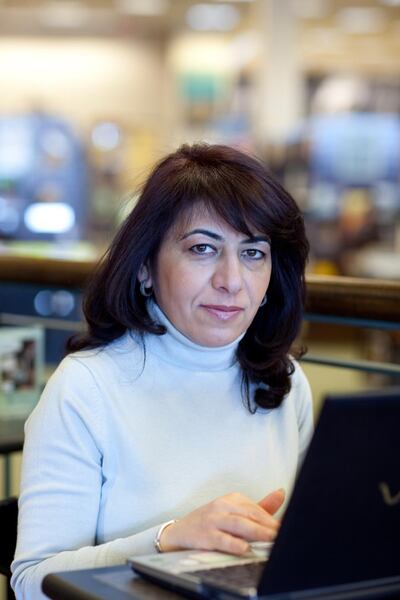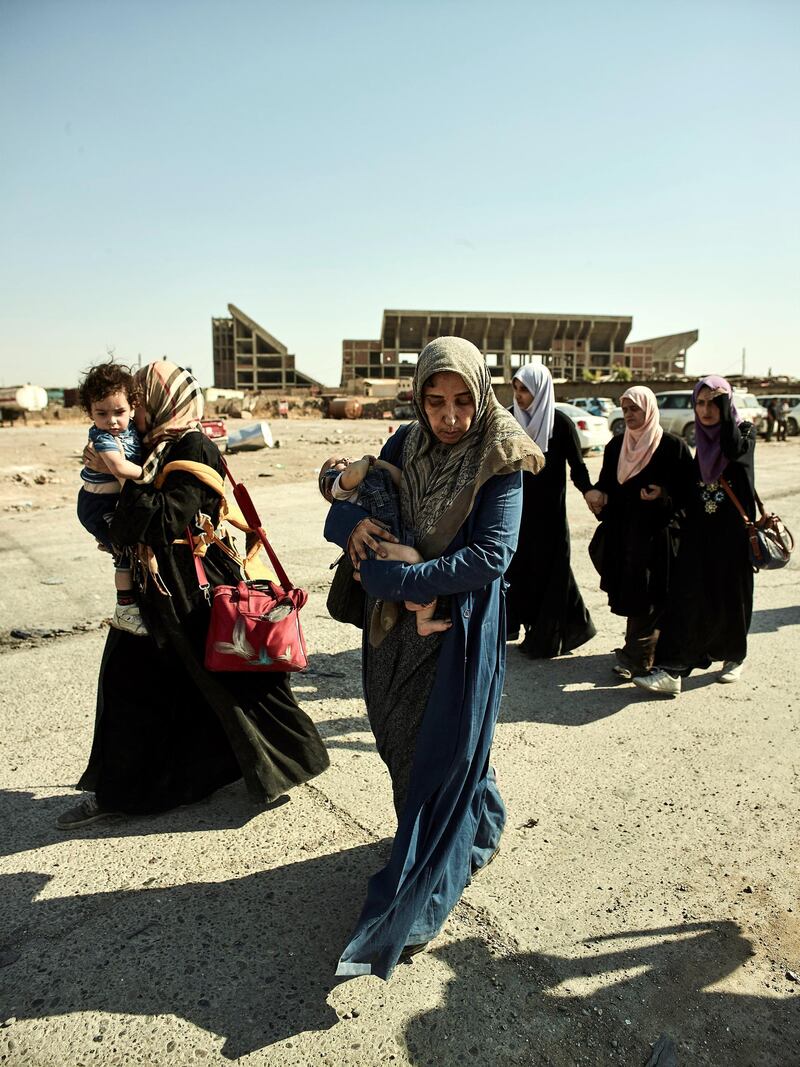It was the summer of 2014 when Dunya Mikhail learned that ISIL forces were not only kidnapping Iraqi women, but buying and selling them in open markets. Mikhail, an Iraqi poet living in the United States, says she "felt so insulted as a woman".
Mikhail, who now teaches at Michigan State University, went on to write Fi Souq Al Sabaya, which was longlisted for this year's Sheikh Zayed Book Award. The English edition, titled The Beekeeper: Saving the Stolen Women of Iraq, was co-translated by the author and Max Weiss and was published by New Directions this month. The book is also being translated into Sorani Kurdish.

On the news, she heard of people being ordered to leave their homes. Online, she watched videos of hundreds of Iraqis fleeing on foot, many of them Yazidis. When Mikhail heard these women’s stories, she said: “I didn’t know what to do with my anger, but I contacted my friends in northern Iraq.”
She called a Yazidi journalist friend, who told her he’d heard horrifying stories from women who’d been kidnapped and escaped. He sent her the phone numbers of three women. At first, Mikhail didn’t call, as she wasn’t sure what to say. When she finally picked up the phone, the first two women spoke Kurdish, and Mikhail knew only a few words. At the third number, a man answered in Arabic. This was Abdullah, “The Beekeeper”, and he helped relay his cousin Nadia’s story. He also told Mikhail he was using his earnings from selling honey to assemble a network of smugglers and help women escape.
Mikhail is a multi-award-winning poet, the author of Diary of a Wave Outside the Sea and The War Works Hard (translated by Elizabeth Winslow) and The Iraqi Nights (translated by Kareem James Abu-Zeid). Yet although she wrote for The Baghdad Observer as a young woman, it had been a long time since she'd practised journalism.
“In the beginning,” she said, “I thought I was going to write a long poem – an epic – in response to that crisis.”
The women's stories
But the more she heard women's stories, and spoke with Abdullah about his attempts to help escapees, the more she "wanted to stay behind the story and not in front of it, so that I could let their voices be heard". There are still poetic moments in the book, which Mikhail says she kept "as breaks for the reader and myself".
Throughout the project, her two selves worked together: “The poet Dunya learns from the journalist Dunya how to make her voice lower than her characters’ and how to make a good beginning and a good end. My journalist self learns from my poet self how to add a personal voice and how to use imagery effectively.”
The stories in The Beekeeper are reminiscent of tales of escapees on the US's Underground Railroad of the mid-1800s or during the Holocaust. In one fairy-tale-like story, a woman named Zuhour escapes from ISIL slavery with her three children – two girls and a newborn boy – who are on the verge of starvation. Zuhour wraps herself in a black abaya, flees, and darts into a seamstress's storefront. Even as she waits, men burst in looking for her. Zuhour keeps her head down, pretending to be a customer. Once the seamstress is finished with the other women, Zuhour whispers, "I'm an Iraqi and I'm at your mercy. I ran away from Daesh. I beg of you, please, give me shelter. That man who was just here is looking for me. If they find me they'll kill me and my children."
The seamstress, Reem, is sympathetic. However, her father is an ISIL soldier. The father is gone for three weeks at a stretch, then returns for three days' leave. During each three-day leave, when her father is at home, Reem hides Zuhour and her three children inside a storage closet, which they line with cardboard to dampen the noise. For a while, this works. But then the baby squalls while the father is at home, and Zuhour nearly suffocates him in an effort to stay hidden.
At that point, Zuhour and Reem realise something must change. They dig up a Kurdistan phone book and call numbers at random, hoping to find help. The first number they call, a person picks up. That person takes down Zuhour’s information and promises to search for her family. Fifteen minutes later, Zuhour’s uncle calls back with a plan: A woman will arrive at the seamstress’s at eight the next morning. If the woman says she’s “with Abdullah”, then Zuhour should leave with her.
Zuhour and her children make it safely out, and the Office of Kidnapped Affairs even manages to send financial thanks to Reem, who calls Zuhour, stunned by the gift. Reem's final words in the story are, "I wish I had gone with you."
The chapter ends with a single line of Mikhail’s poetry: “A ray of light passed through the eye of her needle...”
The merciless ones
The book is a paean for coexistence in a multiethnic, multi-religious, multilingual Iraq. In a short break from the enslaved women’s stories, Mikhail writes about her friend Amani, an Iranian who was forced to leave Baghdad during the Iran-Iraq war. Mikhail also relates this story to her grandmother’s best friend Salima, who was forced to leave along with other Iraqi Jews following the Farhud.
Mikhail remembers trying to ask her ailing grandmother about Salima. Following the line of her grandmother’s thought was like “holding onto the line of a kite being pushed farther and farther in another direction by the wind”.
Finally, Mikhail’s grandmother tells her: “Salima didn’t leave by choice. She would never leave her home.” When Mikhail asks who forced Salima to leave, her grandmother responds: “I don’t know, the merciless ones.”
Mikhail spent more than a year in phone conversations with Abdullah and with the men and women he helped rescue. “Then, after all those voices I listened to and all those tears, I felt the need to go there myself and talk to them face to face,” Mikhail said. “That was my first visit back home after 20 years of absence.”
Mikhail was born in Baghdad and lived through the Iran-Iraq war of the 1980s and the First Gulf War in 1992. It was during the mid-1990s that her poetry came under sustained attack. In 1996, she left first for Jordan, then for the US.
After a year of hearing these women’s stories and seeing their photos on her phone, Mikhail decided the time had come to return. A number of photos from that trip – and even photos taken during the women’s enslavement – are interspersed throughout the book. “Abdullah was sometimes sending me photos with his messages. To keep or remove the photos was part of the debate inside myself. Some of the women preferred to include the photos for documentation and others preferred not, so I followed each interviewee’s preference.”
When the British edition comes out in August, Mikhail said, the photos will be removed. Either way, the stories cannot fail to move the reader.
“What surprised me is how much the women of my country changed after this catastrophe. Before, you would not find a woman in that area speaking about how she was raped, let alone including her picture. But now they want to let the whole world know about this. To bring their personal pain into the public rather than ignoring it might do some justice and honour their need to bear witness – I hope.”
The stories of these women, Mikhail said, “occupied my mind even during sleep. In one of my dreams, I was kidnapped by creatures who came from another planet.”
Although only a few are included in the book, Mikhail listened to many more stories, and wrote many more poems. As she continues to relive the stories, she thinks about writing in yet another new way. “One of the women stayed in touch with me, and her story continued after the book. Her story now developed, and I would write it as a novel this time, so that I can be freer with imagination.”
There are already novels and stories coming out of Mosul, about life under ISIL, including Ghada Siddiq Rasoul’s The Ninevah Diaspora. The historian Omar Mohammed, who tweets as Mosul Eye, has also talked about writing a novel. Mikhail’s is one of themany powerful and difficult testimonies to come.
The Beekeeper was released earlier this week
__________________
Read more:
Ahmed Saadawi’s 'Frankenstein in Baghdad' makes Man Booker International Longlist
[ Book review: Writing as catharsis, how Amy Tan untangled the knots of her past ]
[ Book review: Trumpocracy - an essential read for our times ]
__________________










